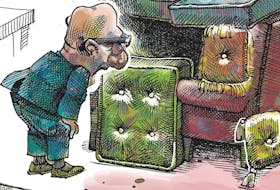What’s the Nova Scotia Health Authority brand?
What image or concept comes to mind when you hear “the Nova Scotia Health Authority?” Do the words summon a pleasant, calming sensation? Or, do they cause major muscles to involuntarily constrict painfully?
Headed toward its fourth year, surely the NSHA has established itself in the consciousness of – built a brand with – Nova Scotians beyond the acronym or stylised wave.
Brand is that magical elixir concocted by masters of the shadowy science and dark art of marketing. The brand can be sweetened or soured by almost anything that comes from within. Good brands are built on a foundation of values, and defined by certain positive attributes.
Organizations work hard to build strong brands so you, the customer identify with their values, and value their attributes.
For instance, last week the NSHA was accredited and told the world it got a 93 on the test. It issued another news release touting some aspects of care done as well or better here than by other big health bureaucracies across Canada.
Competence isn’t a compelling brand attribute, but in a public bureaucracy, we’ll take it.
Some outfits test everything they do for compatibility with the brand. For insight into the NSHA, we could examine something recently conceived, designed and executed to see what, if any, light it sheds on the brand.
The authority wants doctorless Nova Scotians to know it is trying to find them one, and recently hatched a scheme to reach out and touch the thousands of people who put their names on the authority’s “I need a doctor” registry.
The calls would answer questions like: Are you still looking for a doc? Are you still living, and if so are you doing it in Nova Scotia? Do you still have the same phone number?
Caller ID, which is pretty much ubiquitous these days, displayed 000-000-0000 when the NSHA call came in. It turns out a sizable sample of doctorless Nova Scotians are disinclined to answer a call from nothing but zeros.
When a news report identified the zero septenary as NSHA, and suggesting that if the call went unanswered the party could be stricken from the registry, the doctorless registrants responded.
The 8-1-1 number – for non-emergency health stuff – lite up like Times Square and jammed the lines.
The NSHA had to issue another news release trying to assure folks the 000-000-0000 calls were just a friendly “how ya doing?” check-in. No one is being removed from the registry.
So, what does the 000-000-0000 exercise say about NSHA? Maybe it says, “we care” that you don’t have a doctor, but the execution doesn’t inspire confidence.
Among the flaws, a personal favorite is the obvious twofer. One, they thought it was a good idea in the first place; and two, they still do and plan to try again.
Others prefer the inherent goofiness of calling someone on the phone to see if it’s them. Still others can’t get by the number, 000-000-0000, and suggest the NSHA might try something like ARE-YOU-SICK next time.
But picture a bunch of senior NSHA executive-types sitting around a board room table, wrestling with the least of their problems.
“How do we know people on the family doctor registry need family doctors?” says Vice President D.
“Why not call ‘em and ask ‘em?” replies Vice President F, “and while we’re at it, we can make sure it’s them.”
A dozen wise heads nod. They have a plan.
It happens that the guy who takes away the used coffee cups was doing that at the time, and he says, “wouldn’t it be just as easy to wait until you have a doctor for them, and then call, and if they don’t need the doctor, go to the next person on the list?”
The executives cluck sagely at the young man’s naivety and move to the next agenda item.
“We have here an explanation of collaborative care for our website,” says Vice President B, “It’s 24 pages long.”
“Better get it up there,” says Vice President H, “People are saying we’re not communicating well on that.”
And a dozen wise heads nod.
Jim Vibert, a journalist and writer for longer than he cares to admit, consulted or worked for five Nova Scotia governments. He now keeps a close and critical eye on provincial and regional powers.








